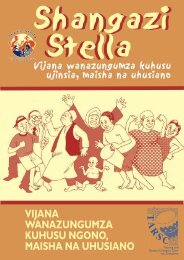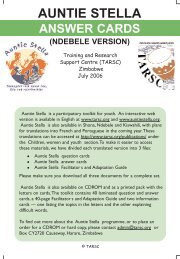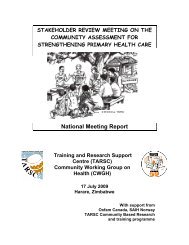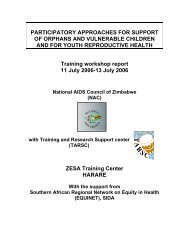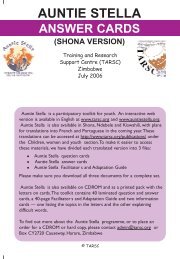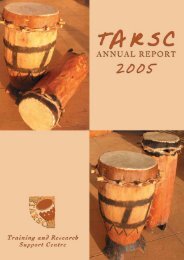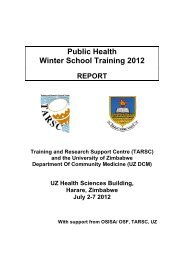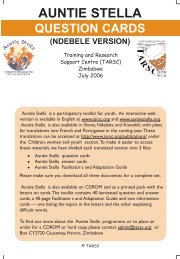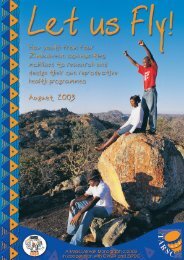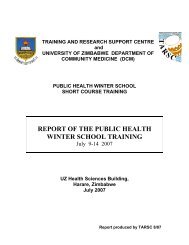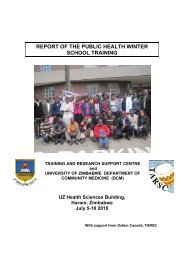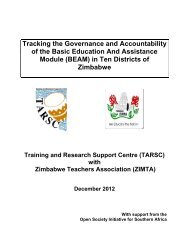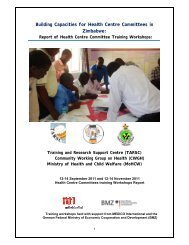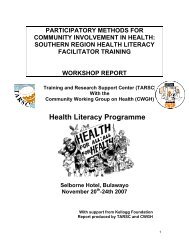HLregional meeting09.pdf - Training and Research Support Centre
HLregional meeting09.pdf - Training and Research Support Centre
HLregional meeting09.pdf - Training and Research Support Centre
You also want an ePaper? Increase the reach of your titles
YUMPU automatically turns print PDFs into web optimized ePapers that Google loves.
1. Background <strong>and</strong> Objectives<br />
<strong>Training</strong> <strong>and</strong> <strong>Research</strong> <strong>Support</strong> <strong>Centre</strong> (TARSC) has implemented the regional health literacy<br />
programme in 2006-2009, in co-operation with Community Working Group on Health (CWGH)<br />
Zimbabwe, Malawi Health Equity Network (MHEN), Botswana Network of Ethics, Law <strong>and</strong> HIV <strong>and</strong><br />
AIDS (BONELA) <strong>and</strong> Botswana Federation of Trade Unions (BFTU) with support from Kellogg<br />
Foundation. Health Literacy refers to people’s ability to obtain, interpret, <strong>and</strong> underst<strong>and</strong> basic health<br />
information <strong>and</strong> health services, <strong>and</strong> to use such information <strong>and</strong> services in ways that promote their<br />
health. The Health Literacy Programme aims to support the development <strong>and</strong> use of participatory<br />
health education materials for health civil society working at community level. The Health Literacy<br />
programme is building core public health skills in civil society facilitators, in actions on health issues<br />
at community level, at national level <strong>and</strong> at regional level. In 2007-9 it was initiated in Zimbabwe,<br />
Malawi <strong>and</strong> Botswana <strong>and</strong> is extending to a wider network through TARSC in the Regional Network<br />
for Equity on Health in East <strong>and</strong> Southern Africa (EQUINET).<br />
The Health Literacy work has in the past three years provided a platform of dialogue <strong>and</strong><br />
engagement between communities <strong>and</strong> the health services to collectively revitalize primary health<br />
care from the bottom to the top. In 1978 the Alma Ata declaration called for universal access, for<br />
equity <strong>and</strong> community participation. In East <strong>and</strong> Southern Africa we lag far behind where we could<br />
be in terms of equity, or even building towards equity, universal access <strong>and</strong> community participation.<br />
We have barely touched the whole question of appropriate use of resources. A strong<br />
comprehensive primary health care system can provide the solution to serious public health needs,<br />
but it is all too deeply mired in entrenched systems, turf battles <strong>and</strong> structural barriers to change.<br />
Yet, we have seen that Health Literacy is the vehicle to address these challenges. A central feature<br />
of the Health Literacy programme is its ability to build a health literacy social movement in East <strong>and</strong><br />
Southern Africa <strong>and</strong> beyond, drawing on simple approaches to change, accountability, flexibly<br />
working within, beside, or complimenting the existing health systems. The values <strong>and</strong> fundamentals<br />
of Health Literacy as a social empowerment process have fostered a commitment to health for all,<br />
<strong>and</strong> a distinctive approach to knowledge. This approach seeks to combine the rationality of the socioeconomic,<br />
socio-political <strong>and</strong> cultural framework, within which Health Literacy is implemented <strong>and</strong><br />
contextualized,<br />
The programme supported national activities 1 through regional planning, regional material<br />
development for common core materials, regional support for monitoring <strong>and</strong> evaluation, mentoring<br />
<strong>and</strong> skills building, regional review meetings <strong>and</strong> exchange programmes in Malawi, Botswana <strong>and</strong><br />
Zimbabwe. In each Country the programme has formalized partnerships (TARSC with CWGH,<br />
MHEN, BONELA <strong>and</strong> BFTU) 2 ; carried out needs <strong>and</strong> capacity assessments to inform material<br />
development; developed <strong>and</strong> piloted health literacy training materials, built facilitator skills, supported<br />
the implementation of the health literacy programme within pilot districts <strong>and</strong> in all three countries<br />
evaluated the programme 3<br />
The Regional Health Literacy meeting was held on the 26 th -27 th of September 2009 in Kampala at<br />
the Munyonyo Speke conference Center soon after the third EQUINET regional Conference. The<br />
Third EQUINET Regional Conference was held at the same venue from the 23rd -25 th of September<br />
2009. The conference theme was 'reclaiming the Resources for Health: Building Universal People<br />
<strong>Centre</strong>d Health Systems in East <strong>and</strong> Southern Africa'. The regional Health Literacy Participants<br />
were able to attend both the EQUINET conference <strong>and</strong> the Health Literacy meeting. This allowed<br />
them to mix with people from other processes in the regional health community to facililate learning<br />
<strong>and</strong> exchange of information <strong>and</strong> ideas building up to the regional Health Literacy meeting. The<br />
meeting convened by TARSC joined participants from the Health literacy implementing country<br />
networks <strong>and</strong> new country partners in the region. It was aimed at reviewing past work <strong>and</strong><br />
1 TARSC (2007) Health Literacy Regional Planning meeting report; 5 January; Harare; TARSC: Zimbabwe<br />
2<br />
A memor<strong>and</strong>um of underst<strong>and</strong>ing between TARSC <strong>and</strong> the implementing country partner has formalized partnerships in<br />
Health Literacy programme of work since 2007. Implementation plans agreed between the implementing country partner <strong>and</strong><br />
TARSC have been used to define roles, activities, financial implications <strong>and</strong> expected deliverables <strong>and</strong> outcomes of each<br />
phase of implementation. (MOUs formalize partnership between TARSC <strong>and</strong> MHEN in Malawi, TARSC <strong>and</strong> CWGH in<br />
Zimbabwe, TARSC <strong>and</strong> BONELA <strong>and</strong> BFTU in Botswana)<br />
3<br />
TARSC (2008) Health Literacy Regional Planning meeting report; 17-18 January; Harare; TARSC: Zimbabwe<br />
7



